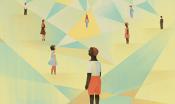495 Results
Advice for First-Year Teachers
Readers' Theater
Creating Questions to Engage Critically with Texts
Intersectionality

Universal Design for Learning: Inclusive Education
Learning spaces are often designed as if all of us were alike, but our communities are rich in diversity, including a range of abilities and needs. By focusing on making spaces, content and learning activities accessible to those with disabilities, Universal Design for Learning (UDL) can benefit all learners while creating more equitable and inclusive educational experiences.
- Applying Universal Design for Learning (UDL) Supports Inclusive Education
- Disability Is Diversity
- Confronting Ableism on the Way to Justice
Civics for Democracy in a Time of Transformation and Possibility
In the new Fall 2023 issue of Learning for Justice magazine, Margaret Huang, president and chief executive officer of the Southern Poverty Law Center, emphasizes that, though challenging, this is also a time of great possibility. Huang explains her hopes: “When I look across our movement today, I see so many people of different races, genders, sexual orientations, abilities and backgrounds showing up as allies for one another in the fight for justice and liberation.
- A Time of Transformation and Possibility
- Civics for Democracy
- Fannie Lou Hamer
Magazine Preview – What It Means To Learn for Justice
In our new fall 2024 magazine, Learning for Justice Director Jalaya Liles Dunn emphasizes the importance of coming together around a shared vision in the practice of democracy. Dunn explains that “We increase our power to foster change when we are in community with one another – deliberating, deciding and taking action.” Our democracy’s strength rests on our ability to commit to one another for a shared purpose that centers our humanity.
- What It Means To Learn for Justice
- Amanda Gorman
- There’s Good People Out There: A Conversation With Charles Person
Understanding the Office and Holding the President of the United States Accountable
The president of the United States is the elected leader of the entire U.S. and must serve all who live here — not merely one constituency. They are responsible to everyone, and we have the reciprocal responsibility of holding the president accountable for everyone’s well-being. This is a central characteristic of living in a democratic society. To evaluate a president’s ability to fulfill the responsibilities of the office, we must understand the role and responsibilities, powers and limits on power, and systems of accountability.
- The Roles and Responsibilities of the President
- What Are the Values of Democracy?
- A Time of Transformation and Possibility